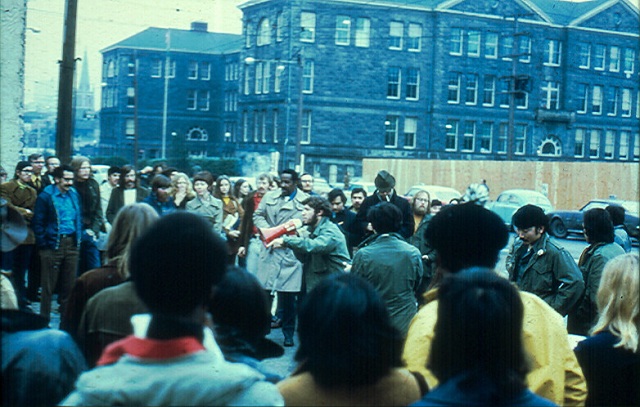
February 9, 1971
Photo credit: Ben Yorita
“The time of the quiet Asian has passed.”
With those words, spoken on the date in focus here by Mike Tagawa, a sophomore at Seattle Central Community College (SCCC), that school’s Oriental Student Union (OSU) commenced a sit-in protest at the SCCC administration offices. The protest was staged to support the OSU’s demand that the Seattle Community College system hire five Asian-American administrators.
The protest began at noon when a crowd of about 200 gathered outside the SCCC Administration Center on Broadway in Seattle’s Capitol Hill neighborhood. Roughly half were Asian-American, while the rest were black, Latino/Latina, and white students who supported the OSU’s demand.
The OSU, founded at SCCC in 1970, was largely inspired by the school’s Black Student Union (BSU), which during the 1968-69 school year had staged similar protests to demand black studies courses and the hiring of black administrators and faculty. Mike Tagawa, the OSU’s 1970-71 vice president, was in fact a member of the SCCC BSU prior to the OSU’s formation. The other crucial OSU leader involved in organizing the protest was Alan Sugiyama, the OSU’s 1970-71 president.
It must be noted here that the OSU’s action was not completely supported at the time among Seattle’s communities of color. Older, more conservative representatives of the city’s Asian-American community reportedly took issue with the OSU’s militant, Black Panther-inspired tactics. Meanwhile, although the Seattle Black Panther Party publicly supported the action, much of Seattle’s black community, including the SCCC BSU, reportedly did not. Such was the fragmentation among the American left, in Seattle and nationwide, in the year 1971.
The OSU would again take over the SCCC offices, this time more forcefully, on March 2, 1971, and the pressure generated by that protest action would eventually lead to acquiescence by the school’s administration. Following negotiations facilitated by leaders in the local Asian-American community, SCCC agreed to hire an Asian-American administrator for the 1971-72 school year. Not long after, SCCC hired Frank Fujii as a department head and Peter Kosi as Director of Minority Affairs. Eventually, in 1990, the district would also hire an Asian American, Peter Ku, as president of North Seattle Community College. In 1998, Ku was promoted to chancellor of the Seattle Community College District.
Sources: John de Yonge, “SCC Trustees to Consider Oriental Student Demands,” Seattle Post-Intelligencer, February 9, 1971, p. 7; John de Yonge, “SCC, Oriental Students to Negotiate,” Seattle Post-Intelligencer, February 10, 1971, p. D; Stephen H. Dunphy, “No solution reached on Asians’ demands,” The Seattle Times, February 10, 1971, p. E4; “Asian-Ancestry Community College Students Demand Official Voice,” The Facts, February 11, 1971, p. 1; Robert Marshall Wells, “Ku retires with legacy as steadfast promoter of community colleges,” The Seattle Times, June 13, 2003; “Oriental Student Union Sit-In,” Seattle Civil Rights & Labor History Project (http://depts.washington.edu/civilr/aa_osu.htm).